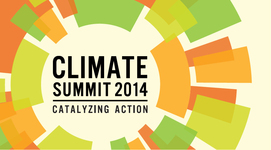 New York The 29th session of the General Assembly was accompanied with a Climate Summit on September 23 this past week. While trying to get to grips with what the Climate Summit was all about, I soon discovered that it was much about getting carbon pricing accepted as a mitigation measure for global warming. This time, like never before, both public and private actors were present at a Private Sector Forum lunch-on, preceded by a Business and Civil Society Special Session to demonstrate broad support for carbon pricing back-to-back with the 69th General Assembly gathering of the UN. World Bank Statement The Global Compact is the highest level appearance of a public-private partnership presumably aiming at the protection of global public goods. The Global Compact that connects multinational companies with the Secretary General's office of the UN and the International Finance Institutions like IMF and the World Bank, exercised quite some influence on this policy topic. Multiple voices joined together in one big choir jubilating the carbon pricing solution, already pre-cooked in a World Bank Statement, my senses were tested to the maximum to spot a single voice questioning the approach. Nobody at the meeting did. Even NGOs were united in their plea for carbon pricing. Not for no reason as there were strict criteria used to select the business partners that could attend the session (by invitation only): Leaders who sign up to the criteria agree to (1) set an internal carbon price high enough to materially affect investment decisions to drive down greenhouse gas emissions; (2) publicly advocate the importance of carbon pricing through policy mechanisms that take into account country specific economies and policy contexts; and (3) communicate on progress over time on those criteria in public corporate reports. Profit driven Nobody seems to raise the obvious question: Why would oil and gas companies stick out their necks to favour a system that is supposedly charging them with much higher production costs? I could not think of any other motivator but profit. Those companies that have sensed the public opinion best over the last decade already started with internal carbon pricing, not charging it to the client yet. This gives them a huge comparitive advantage over their competitors who have not yet developed the system or were not part of the Chicago Climate Exchange pilot, which saw an early demise in 2010. Is this just an attempt to revive it? Setting standards has always been used to push underperformers out of the market. Hence the firm belief in a free market mechanism that promises to bring the few that can still afford to pay highest quality for lowest price. The question is: Do we have faith in the market as a regulatory framework that compels us to do good and adhere to higher ethical standards? Monetization Soon the world will start monetizing all its natural resources, as China already showcased in Africa, basically allowing for trading them. If finance is not limited (like for some it seems it is not), what will prevent us from destroying the earth's natural ecosystems for short-term benefits? Carbon pricing, if not properly implemented, basically transfers the flaws we have experienced in the financial markets to natural capital markets, allowing for bubbles that burst with unprecedented consequences. I prefer not to live in a monetized world. And I hope, the girls and boys at the UN get back to their senses in time to question the proposals that now have broad support from industry, civil society agents and science circles, when further discussing how to reverse climate change and deal with its impacts already seen around the world. Peruvian rescue? In December some next steps will be taken in Lima, Peru, where the 20th UN Climate Change Conference (COP20) will be held. Lima, take your chance to bring in some critcal thinking before in 2015 Paris nails down an irreversable climate deal that will only aggravate the current problems. Getting to zero emissions globally should be the goal, not the provision of a 'right to exhaust'. It will turn carbon into a commodity market that will be highly vulnerable to corruption. It was obvious that the General Assemblies' agenda had been overshadowed by the recent events in the Middle-East and security threats they pose to the rest of the world. In analysing the cause of these conflicts, the Gambian and Iranian Presidents were quite outspoken pointing to previous unsuccessful Western engagement in the region and general neglect of the impact of their colonial past. Likewise the General Assembly (notably the 77 + China) has always stressed the importance of differentiated national commitments. I just want to add that carbon emission rights should not become the 'capital' that pays for 'development cooperation' in the future, replacing the already diminishing Official Development Aid. Private Sector and State Leaders at the Private Sector Forum and speaking at the 69th General Assemly in New York (source: UN Web TV)
0 Comments
Leave a Reply. |
About meMy name is Reinier van Hoffen. U®Reading
Click here for a summary.
Also find the text of a lecture Dr. Achterhuis held at the 2012 Bilderberg conference. Archives
August 2022
|
AddressNachtegaallaan 26
Ede, the Netherlands |
Telephone+31 (0)6 1429 1569
|
info@uraide.nl
|
 RSS Feed
RSS Feed
















